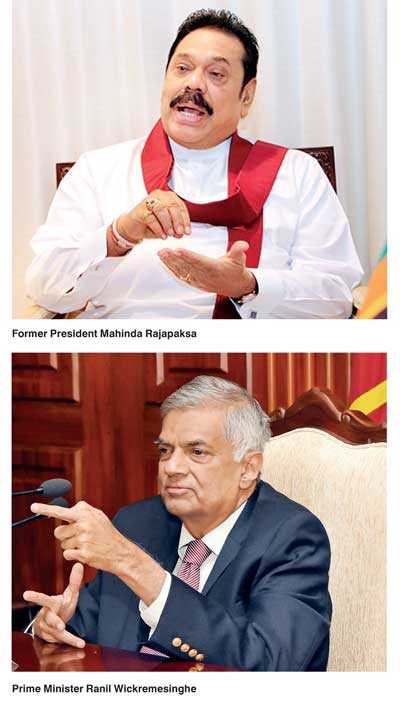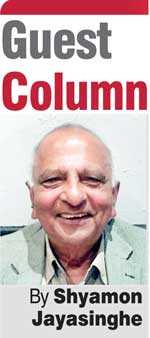Monday Feb 16, 2026
Monday Feb 16, 2026
Thursday, 27 September 2018 00:00 - - {{hitsCtrl.values.hits}}
 “Ehi passiko” is a methodological statement in expressed in Pali and attributed to the Buddha. The sage asserted that his Dhamma must be experienced to be proven. “Come and experience” (ehi passiko)! Former President Mahinda Rajapaksa has said the same about his solution to the currency crisis. “Hand over back to me and you will experience the solution,” like seeing something currently unseeable in broad daylight.
“Ehi passiko” is a methodological statement in expressed in Pali and attributed to the Buddha. The sage asserted that his Dhamma must be experienced to be proven. “Come and experience” (ehi passiko)! Former President Mahinda Rajapaksa has said the same about his solution to the currency crisis. “Hand over back to me and you will experience the solution,” like seeing something currently unseeable in broad daylight.
Seen the video?
I am thoroughly amused watching a video doing the rounds on Facebook. It is issued with a caption in small lettering: “Sinha Lokaye Sinhaya” (The Lion in the World of Lions). The lion is none other than former tough man Mahinda Rajapaksa. He is fortified by a ring of advisors that includes the former Central Bank Chief Nivard Cabraal.
It is a media conference in Colombo over the subject of the falling rupee. This is where MR, with his customary bluster, announced: “Give the government to us and you will see the solution.” The video doesn’t give the speech but it does show a hilariously classic cameo of the proceedings where a media guy asks him if he could specify a broad timeframe for solving the crisis as promised.
The oral response and the body language of our dear old leader, Mahinda, shows up his vacuous mind when it comes to even basic economics and finance. When the question was posed, Mahinda’s face went into a pale blank. He showed he was clearly out of depth.
Turning his back to his former loyal Cabraal, Mahinda didn’t even seem to have grasped Cabraal’s laboured prompt. A long delay for comprehension would have left the audience gasping for breath, laughing. Hence, Mahinda blurted out an irrelevant response: “All this rise is due to the present situation,” said he.
Mind you, I am not exaggerating, this is a performance of the former President who, embarrassingly, also held the portfolio of Finance over his 10-year rule as supremo of Sri Lanka. If Mahinda didn’t know the answer to the question raised, he obviously wasn’t serious when he said he would fix the problem if only he was returned his power.
Did Mahinda think that this is like fixing a leaking tap or, at higher lever, fixing the indiscipline in our universities? Give a firm decision! Stamp your foot and tell Mr Rupee: “No. You shall not go down!” Or, like Jesus Christ addressing Lazarus, the dead man, “Rise!”
Not like winning the war
Mahinda Rajapaksa never ever demonstrated any intellectual prowess or studied policy analysis. To be fair by him, he didn’t think such skills as matters for recognition. Mahinda rose to political power while he was basically a chandiya in politics.
He did have amazing luck twice: one, to be the Prime Minister under CBK. Two, to have the war with the LTTE finished during his time. Mahinda and brother Gota claim to have won that war single-handed from their seats in Colombo. However, the moot point is that that had been a ground battle requiring moment to moment lightening decision-making with regard to micro strategy. It was physical and dangerous.
This being the reality in fighting ground, water, and air battle, the line of command can never come all the way from Colombo. That isn’t practical. The line of command is short and swift – shooting down from the commanders and majors – starting there and ending in a short line. Besides, the time had been internationally ripe to enable a victory.
Gut won’t help
That is, however, a different story. I gave a brief reference to that in order to explain that the falling rupee cannot depend luck, on sheer bravado or on chandi guts. It requires day-to-day study of the overall dimensions and dynamics of a crisis that is global in origins. It requires adjustments of domestic policy. It does demand hard domestic decisions, too, that would cause pain to the people and that places the Government’s own popularity at stake in an electorate which would never be able to access this knotty issue.
What makes it all worse is that elections are not far away. Probably, Mahinda’s bluster is tuned to the nearness of elections. He is a great populist and he knows how to duck and to evade when things don’t turn out as promised.
Lankan economy’s structural weakness

A complete difference is observed within the Government ranks and particularly with its leader, Prime Minister Ranil Wickremesinghe. The contrast reflects something vitally different about the quality of these two key leaders of Sri Lanka. Two days ago, Ranil Wickremesinghe at a public meet in Nattandiya clarified the whole genesis of the currency turmoil in simple language for the Nattanadiya people.
The Prime Minister recognised one fundamental cause as being the weak structure of the Sri Lankan economy. This is has been the defining feature over many decades since independence. The Sri Lankan economy is an import dependent one and a debt economy consequent to that.
The result is that the balance of payment has been on deficit, occasionally relieved by foreign remittances. This adverse balance impacts on the rupee. The balance of payment is in deficit due to repeated deficits on the Trade balance. Our trade balance is negative because of our severe import dependence.
Nimal Sanderatne, commenting in his column on economics in the Sunday Times, states that over the last three years there has been “impressive growth in exports,” but that that increase has not been sufficient to swallow up the huge import bill that is growing.
The PM did point out how the Government has been focusing intently in order to change that structure and build strong foundations.
Developments in US
On the other hand, said the PM, what Sri Lanka now faces is the outcome of Donald Trump’s new trade tariff polices with China. It is an all-out trade war that is going on these days. Trump has imposed tariffs on imports from China after so many years when that great continent piggybacked on the US leniency in order to access US markets at cheap prices. China benefitted more by this and US industry suffered. Now, America is witnessing a kind of resurgence in its economy where domestic investment is on the rise and dollars are flowing in. The American dollar has gained in strength.
This means that other currencies, world over, have to compete with a rising dollar. The US economy being lucrative, capital funds are pulled out by investors from other countries and shifted to the US. This means a flow out from Stock Exchanges of small countries like Sri Lanka.
The Central Bank Governor in a special report gave the statistics of currency depreciation of comparable economies. Sri Lanka down 8.5 %; India down almost double that to 15.2%; Indonesia to 18%; even China down to 5%. This clearly reflects a trend due to global reasons and that reason is the Trump trade policy thus dismissing the claims of Government critics that it was all due to financial mismanagement by the Yahapalanaya Government.
The PM pointed out that one solution was to raise interest rates in order to keep the island economy attractive for foreign investment. But that, he admits, would have other serious consequences within the domestic economy. The Prime Minister has discussed this whole issue studiedly with his own team and before the peoples’ forums. “Trust me,” the PM assures. “I will navigate this problem successfully.”
The crisis demands a navigation all right and that demands economic planning. Steps have already been taken to curb non-essential imports.
I would rather trust the Prime Minister’s assurance than wait for Mahinda Rajapaksa’s ehi passiko. Economics is Sri Lanka’s central problem and of all our leaders only the UNP and Ranil Wickremesinghe seem to be talking economics. Most other political leaders are more concerned with tribal issues.
How will ehi passiko work?
How will Mahinda Rajapaksa’s ehi passiko work? He wouldn’t tell us how he is going to sort this out if people go back to him with the enthusiasm for experiencing the magic at work. The media interview, however, showed only too baldly that Mahinda was bluffing to return to power. Okay let’s try giving it over to him again. The outcome: we won’t get it back again in the foreseeable future.
Hung Sen, the dictator in neighbouring Cambodia is there for three decades, but there aren’t any signs he is going to relieve his people of his burden. Hung Sen’s brothers and sisters and everybody close are in a tight ruling regime that would require God’s intervention to dislodge.
(The writer can be reached via [email protected].)